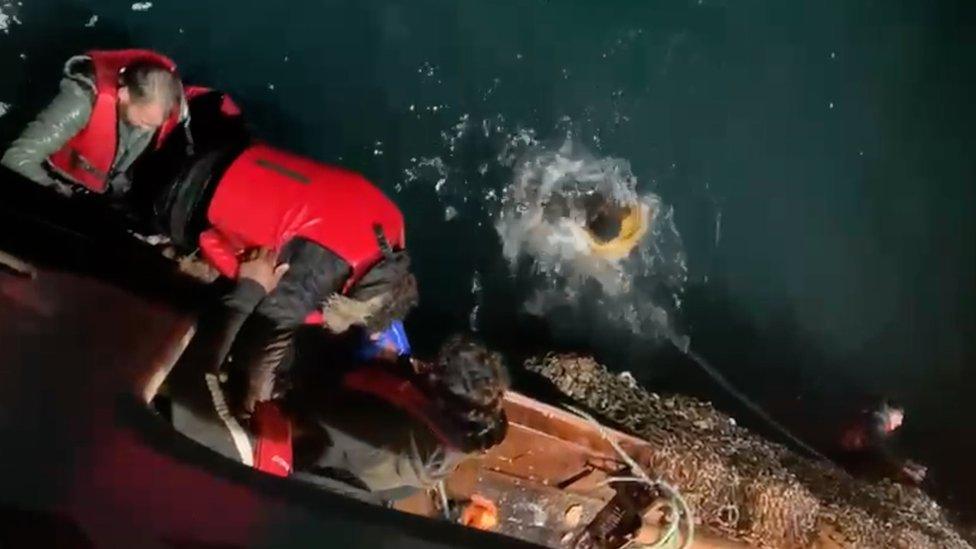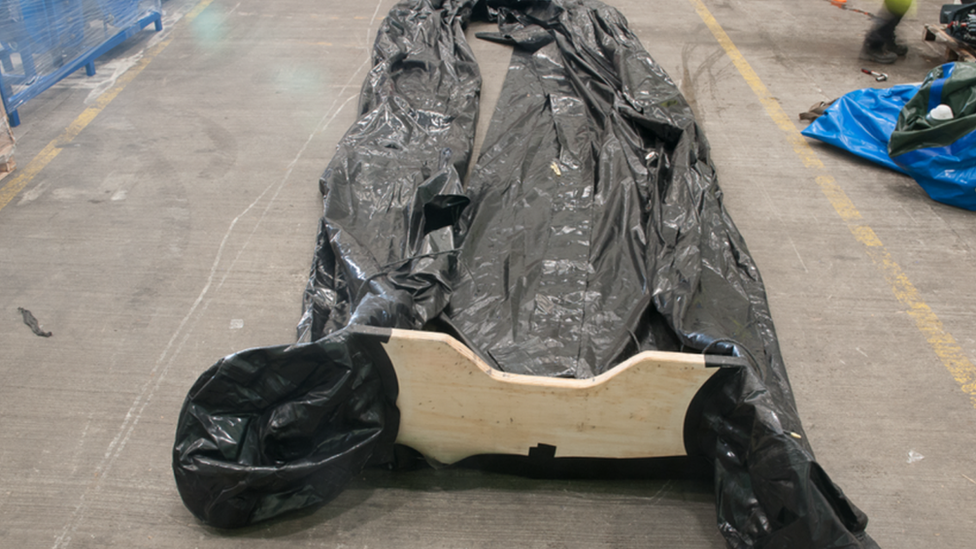The unprecedented case of a migrant manslaughter trial
- Published

Ibrahima Bah, sketched at a previous hearing, had continued the crossing even after signs the boat had been deflating, jurors heard
A migrant who was navigating an inflatable boat when it started sinking in the Channel has been found responsible for the death of four people. The unprecedented case raised complex questions about whether the asylum seeker who piloted the boat could be blamed for the drownings, in 2022.
Ibrahima Bah was convicted after two trials at Canterbury Crown Court - the first time a migrant who navigated an inflatable has been found responsible for harm caused to other occupants.
Canterbury Crown Court heard 39 people, including Bah, had been rescued about 200m (650ft) inside British waters on 14 December 2022.
Thirty-one were brought on board a British fishing trawler, towards which Bah had steered the dinghy.
Others were saved by two lifeboats assisted by a Royal Navy patrol.
Kent Police have been able to confirm the identity of only one of the men who died, Ahmadi Herjatullah.
The body of a fifth believed to have drowned has never been found.
Watch: Dominic Casciani breaks down the video from the rescue in the English Channel
Over the course of two trials in the past year, prosecutors told jurors Bah could be held responsible for the deaths of the four recovered bodies because he had been part of a criminal agreement to pilot the unseaworthy vessel or had failed in his duty of care to keep everyone safe.
Bah said he was not the skipper but just one of some 40 desperate people trying to claim asylum in the UK.
The jury in the first trial, last July, failed to reach verdicts, triggering a retrial.
Bah left Senegal in 2019 and spent two years in Libya. It's not clear how old he is due to uncertainty about his date of birth - but there is no dispute that he was an adult by the time of his trial.
After he and others had been rescued in the English Channel, he told detectives he had reached Italy after steering a boat over the Mediterranean and hoped ultimately to find a job in sheet-metal work.

A trawler crew pulled the migrants from the sea
He then left Italy for France, spending five months in Bordeaux before moving on to the migrant camps between Calais and Dunkirk.
Three months later, a Kurdish smuggling gang finally offered Bah and a friend free passage to the UK, if he would agree to steer the boat.
The friend, thought to be among the five who drowned, has not been formally identified.
Bah told the jury he had joined men from Afghanistan and Sudan and the smugglers had used sticks to coerce the group into preparing the inflatable and quickly carrying it on to the beach.
When he had seen the condition of the boat - which was entirely different to those he had piloted in Senegal - Bah had tried to pull out but had been immediately threatened with extreme violence.
"Someone came from behind and hit me and I fell," he said.
"Some of them were kicking me. Nobody dared to challenge them. The others heard me screaming - but nobody came to help me.
"What could I do? If I did not go [to the beach] they could kill me. I could only do what they wanted me to do, to save my life."
The remains of an English Channel inflatable recovered by the UK Border Force.
But Duncan Atkinson KC, prosecuting, said Bah had shown no injuries to British medics after his rescue - and he could have later turned the dinghy around, after it had begun to take on water and lose air.
"For an hour and a half you had been driving your boat forward, with people screaming and water at knee level," Mr Atkinson said.
"You controlled the speed and direction."
Two Afghan men at the front of the boat used their phones to give Bah directions.
When the group saw the lights of a fishing trawler, they headed towards it. Some stood up, the centre of the dinghy collapsed and it began to sink.
When UK Border Force experts later examined the remains of the inflatable, they concluded it had not been remotely seaworthy but designed to pack in as many people as possible to maximise profits.

The inflatable was not seaworthy
Jurors could convict Bah of manslaughter only after considering a number of critical legal questions as to whether he could be blamed for the deaths.
If the jury thought Bah might have felt forced into steering the dinghy, then he could not be found guilty of the manslaughters or facilitating illegal immigration - a lesser charge he also faced.
If jurors believed Bah had freely gone to sea, they could convict him of manslaughter only if sure that reasonable people would have realised that the journey risked death and, crucially, his steering had contributed to the tragedy. The jurors could also consider whether Bah was guilty of causing the deaths through gross negligence - a form of homicide that applies to cases where someone has a clear duty of care to others who were fatally harmed.
One survivor told BBC News many on the boat did not know each other or speak each other's languages.
"People stood up inside the boat and then the boat collapsed," he said.
"I didn't know whether [the driver] was a smuggler, refugee or asylum seeker - but he helped us and saved us.
"He was speeding the boat to get closer to the fishing boat and also turned and swerved the boat in a way that helped us."
'True colours'
Richard Thomas KC told the jury Bah could not be blamed - and had feared for his own life. Nor could he be considered to be in charge of the vessel - he was just one of a group of people who wanted to seek asylum.
"It's only on the beach that the smugglers show their true colours," Mr Thomas said.
"The defendant had not been on the beach before - this was his first attempt [to cross].
"Is it possible that when he agreed to drive the boat, he did not realise that they would threaten to kill him, beat and punch him?
"You have to ask yourself a different question - that running away was not possible."
Complex clash
Since 2022, it has been a criminal offence to arrive in the UK without permission.
Mr Thomas said the only way for Bah to exercise his separate legal right to seek asylum had been to present himself to UK Border Force officers in Dover.
Immigration rules say asylum seekers, unless accepted on to one of a few limited UN-related scheme, must apply in person in the UK.
But at the same time, the trial heard, the government did not give permission in advance to travel to claim asylum.
That complex clash between two separate laws - one aiming to punish illegal immigration, the other to protect genuine asylum seekers - has been argued over in the Court of Appeal in London.
And in March, three senior judges ruled anyone taking a small boat to Dover without prior permission was breaking the law - even if intending to seek asylum.
